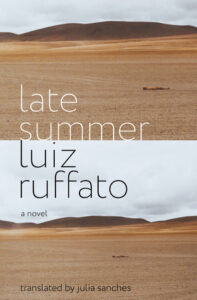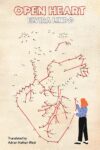
[Other Press; 2021]
Tr. from the Portuguese by Julia Sanches
“Cataguases . . . There is something more beautiful and serene hidden in your flanks / In your streets plays the unconsciousness of cities/ that never were, that don’t care to be/ You don’t know, I don’t know, no one will ever understand what you desire, what you will be/ You are not of the past, you are not of the future; you have no age . . .”, writes Brazilian poet Ascânio Lopes in 1928.
Contemporary Brazilian literature highlights hope and hopelessness arising from social, economic, and political crises in the country. Writer, poet, and journalist, Luiz Ruffato (1961), has become a distinct voice spotlighting life in modern Brazil since his third publication There Were Many Horses (Eles eram muitos cavalos, 2001), an antinovel with sixty-nine micro-stories set during the course of one day in São Paulo in 2000. In Late Summer (original title: O verão tardio) Ruffato uses the final days of an ordinary Brazilian man returned to the city of Cataguases to subtly confront the societal changes and inequalities in Brazil.
The past becomes a construction of one’s memory. “Back to square one, the snake eating its own tail . . . Cataguases . . .” thinks the disillusioned protagonist Oséias Moretto Nunes. After thirty-five years living in São Paulo, the terminally ill Oséias returns to his hometown Cataguases in southeastern Brazil to seek answers for his existential dissatisfaction. His wife Marília asked for a divorce and he lost contact with his son Nicolau. Unemployed, after years working as a sales representative for a farm supply company, with only a backpack filled with his clothes, he returns to his roots and retraces his memories.
Yet Oséias and Cataguases are no longer the same: “a place so changed that it seemed to hold no trace of the person I’d once been.” The novel is divided into six spring days where he wanders through his hometown, and revisits his siblings one by one. The Moretto Nunes family had humble beginnings; their mother Stella was a seamstress and their father José a laborer, but each sibling now belongs to a different social stratum. Rosana lives a comfortable lifestyle and is focused on her quest for eternal youth and trips to New York; Isinha lives in a constant struggle for basic survival with her alcoholic husband, taking care of her children and grandchildren; and João Lúcio became “filthy rich” and lives isolated from the rest of the family in Rodeiro. Oséias longs for communication, some form of reconciliation, but no one wants (or can) grant his wish for intimate connection.
A lonely man attempts to come to terms with his life’s impermanence. What has been the meaning of his existence? Is it bad to fail at life? In Cataguases, Oséias tries to come to terms with his life and past choices.
Ruffato uses a first-person narration, stream of consciousness, where Oséias’s inner world, forgotten memories and swirling thoughts, coincide with the present day and conversations with family and old friends. Oséias is a spectator trying to revitalize his memories, but everyone is locked in their own worlds, where there’s no place for him. The plot is permeated by flashbacks. Past and present converge: “The future is only a projection of the past. We are what we once were. We make our own path. We design our own course. When we choose one direction over another, we set the boundaries of what will come later.”
There’s a tinge of disillusionment when Oséias fruitlessly attempts to connect with old friends, as if they could explain his life’s trajectory. He soon finds out that the “past is ruins”: from his disinterested classmate Marcim who became mayor of Cataguases; the gruff Alcides “The Beast,” a boy with violent tendencies who now has a precarious job as a waiter in a cafeteria; his high school girlfriend Marilda who notes that life is “all about regret . . .”; to his gay art teacher Mr. Mendonça who now lives in isolation. To them he’s only a vaguely remembered figure from the past.
The hopelessness of having no one to return to weighs heavily on his shoulders, which are already burned with the shadow of his memory of his 15-year old sister Lígia. Her death gives the impression that it has forever changed the dynamics and course of the lives of the Moretto Nunes family — though the subject is not really touched upon — and Lígia has become a distant memory. Only Oséias bears the scars and her presence still feels “real” to him. As his sister Rosana notes: “We’ve got to live in the present. In the moment! You keep looking back. You can’t see what’s around you, much less what’s right under your nose.”
The industrial town of Cataguases is ever present in Late Summer. Through his reunion with the city, the story becomes allegorical; a small snippet of history is shown which reflects the current fabric of Brazilian society. Ruffato subtly weaves in criticism and social issues in the narrative: from the recurrent floods in the city, social mobility and communication between different social classes, Christianity, the living conditions of the workers in the textile industry, to the iron that is dug up and transported from the city without most of the wealth remaining in it, leaving “just muddled rivers and hollowed hills.”
Ruffato not only subtly intertwines his themes; his straightforward, sometimes sad, sometimes brutally honest language also wraps you into a cocoon: you find yourself wandering the cobbled streets of an industrial Brazilian town, a place in a time that never returns. But there’s a disquiet and ruthless attentiveness hidden in the words. It’s not the umpteenth story about a man coming to terms with his inevitable end. He shows how defenseless we all are.
Late Summer reflects on loneliness, existential angst, and our human ambivalences. Ruffato neatly categorizes the chaotic structure of a Brazilian man’s consciousness wrapped up in memories of the past. The inevitable structural changes in Cataguases and the influence of time has blurred Oséias memory, “like a photograph that fades little by little until suddenly it’s only a series of whitish smudges without meaning.”
An ordinary man is lost and lonely amidst the crowd. In Cataguases, he tries to add warmth to his life by opening up to the sublime spring lights.
Giselle Defares is a writer whose work has appeared in Vice, Electric Literature, HuffPost, among others.
This post may contain affiliate links.







